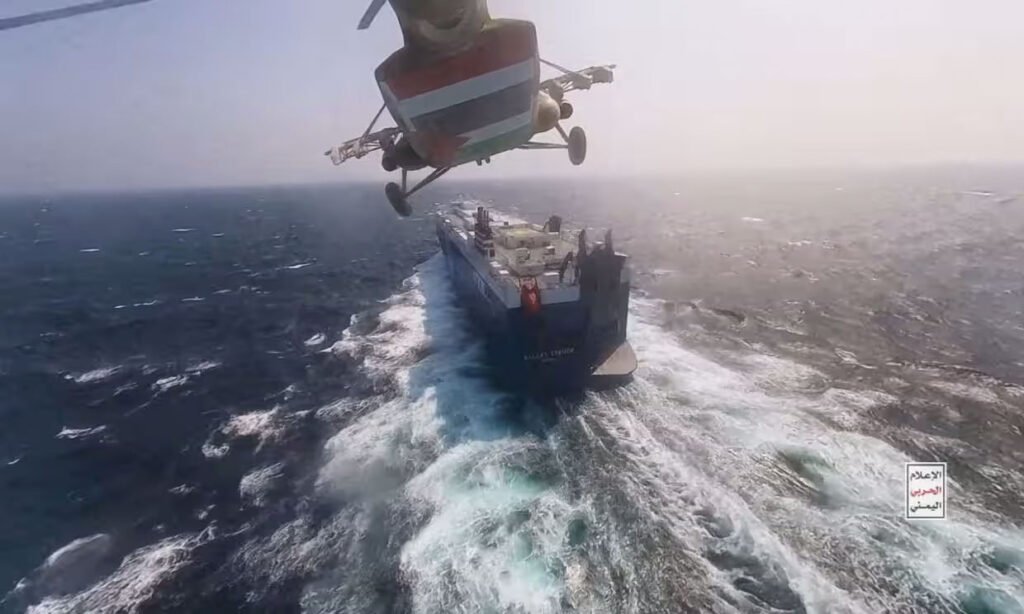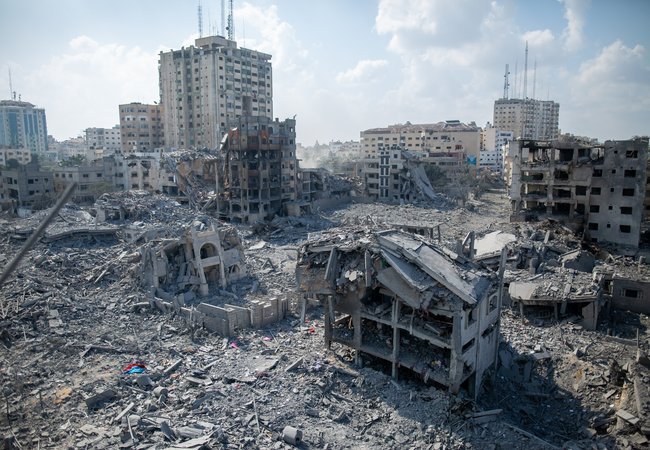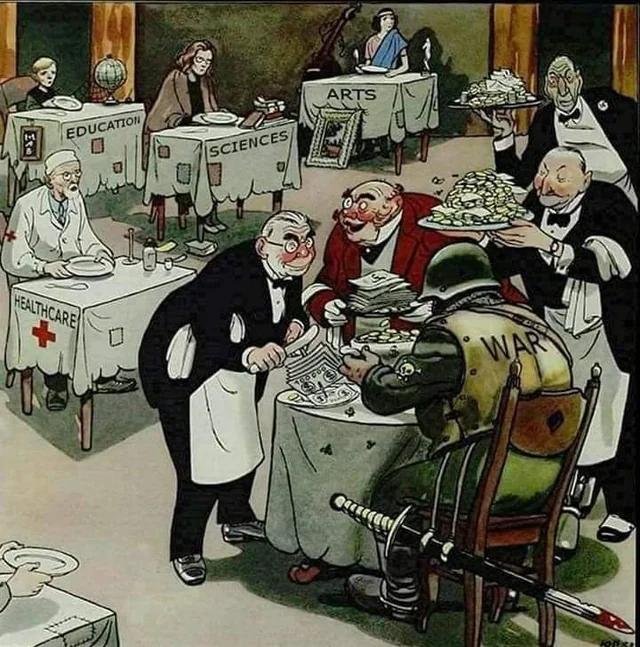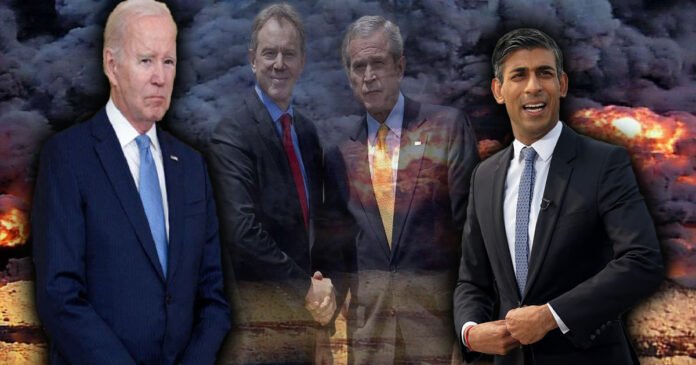With President Biden exhibiting signs of senility and unelected Prime Minister Richi Sunak Drownding in the Polls, We Inch Closer Reigniting A Middle East Conflict
Somehow, I can’t help thinking we’ve all been here before…
By Paul Knaggs
In a controversial military intervention, UK and US forces have launched airstrikes against Houthi rebels in Yemen. The raids early Friday, involving jets and cruise missiles, targeted over a dozen sites in Houthi-held areas.
The pre-dawn airstrikes on Yemen by British and American forces represent a concerning escalation in the protracted conflict ravaging the nation. Under the premise of protecting shipping routes, the bombing raids fan the flames of war in an already destabilised region. While intended as a “strong signal,” the long-term consequences may prove far more ominous.
Biden said the strikes followed “unprecedented” attacks by the Houthis on commercial ships in the Red Sea and warned he would “not hesitate” to take further action if necessary.
“These targeted strikes are a clear message that the United States and our partners will not tolerate attacks on our personnel or allow hostile actors to imperil freedom of navigation,” Biden said of the attacks by air and sea.
Houthi attacks in the Gulf of Aden and the Red Sea have heightened tensions. The U.S. reported multiple incidents, including missile launches and drone attacks.
The Houthis have sporadically targeted ships in the region over time, but the attacks have increased since the start of the war between Israel and Hamas and spiked after an explosion Oct. 17 at a hospital in Gaza killed and injured many.
That hospital blast marked the beginning of an intense militant campaign against U.S. bases in Iraq and Syria, and on many commercial vessels transiting the Red Sea. The attacks have damaged commercial ships and forced international shipping companies to divert their vessels around the Cape of Good Hope.
As of Thursday the Houthis had launched 27 different attacks on vessels transiting the Southern Red Sea, Pentagon spokesman Maj. Gen. Pat Ryder said at a Pentagon press conference.
Houthi military spokesman Brig. Gen. Yahya Saree has said the group wants to “prevent Israeli ships from navigating the Red Sea (and Gulf of Aden) until the Israeli aggression against our steadfast brothers in the Gaza Strip stops.”
But few of the ships targeted have had direct links to Israel. In a recent attack, one of the commercial ships hit — the Unity Explorer — had a tenuous Israeli link. It is owned by a British firm that includes Dan David Ungar, who lives in Israel, as one of its officers. Israeli media identified Ungar as being the son of Israeli shipping billionaire Abraham “Rami” Ungar. But any Israel connections to other ships are unclear.

The Bab al-Mandab Strait, a vital global shipping route, witnessed repeated incidents, raising concerns over the safety of vessels and international trade.
The Houthi actions have drawn strong responses, reflecting the delicate geopolitical situation in the region. The Bab al-Mandab Strait, known for its historical significance, remains a crucial passage for seaborne commodity shipments.
However, Yemen’s Houthi rebels have shown no sign of backing down on their attacks in the southern Red Sea on ships they say are linked to Israel.
In a statement late on Friday, the Houthis’ Supreme Political Council threatened that “all American-British interests have become legitimate targets for the Yemeni armed forces in response to their direct and declared aggression against the Republic of Yemen.”
“The joy of the aggressors will not be long, and our hand will be the upper hand, God willing,” the statement from the Iran-linked group added.
Earlier, the Houthis called the strikes on Yemen “barbaric”, threatened retaliation and also said they will continue targeting ships heading towards Israel for as long as its war on Gaza continues.
“The American and British enemy bears full responsibility for its criminal aggression against our Yemeni people, and it will not go unanswered and unpunished,” Yahya Saree, the group’s military spokesperson said.
The Disruption of Trade Routes

We all remember how one stuck ship in the Suez can cause an economic downturn…the Ever Given, the same ship that launched a thousand memes when it got stuck across the Suez Canal in March 2021 held up nearly $60 billion of trade lays witness to that tale of woe.
Europe’s over-reliance on both Middle Eastern oil and Asian manufacturing has created a weak point that can and will be manipulated.
Red Sea disruptions cost companies millions of dollars. Global supply chains have faced severe disruption as a result of Houthi attacks in the Red Sea.
The world’s largest shipping firms have been diverting vessels away from the Red Sea and onto a much longer route around Africa’s Cape of Good Hope and then up the west side of the continent.
That adds at least 10 days and millions of dollars to shipping calculations – costs which are then passed onto customers.
Given 12% of annual global trade passes through the Red Sea, the potential disruption for global supply chains could be enormous. Consumer goods “will face the largest impact”, according to Chris Rogers, head of supply chain research at S&P Global Market Intelligence.
This leads us to Sunak’s excuse for the bombing…Houthis are ‘damaging people’s shopping’, he stated while defending UK strikes. Rishi Sunak said the UK needs to send a “strong signal” that Houthi rebel attacks in the Red Sea are wrong and cannot be carried out with “impunity’”.
Speaking in Ukraine, where the PM has just handed over £2.5 billion of our money to Zelensky’s GoFundMe the PM said he had backed “necessary, proportionate and targeted action”. The PM also said the Houthi rebel attacks on shipping was having a “damaging impact on people’s shopping” in the UK.
Well, one thing is for sure it is now…

The stated rationale rings hollow. To suggest these assaults are to reduce the impact on the average person’s shopping is just fanciful and insulting. It seems it’s ok to carry out military attacks to keep prices down. It’s a good job we don’t take that view when Energy companies inflate the price of electricity for their profits. However, Following the UK and US military strikes against the Houthi rebels in Yemen, Oil prices have jumped by 4% this morning.
Raising concerns about a possible inflation shock for the world economy, Brent crude prices jumped by about 4% to a high of $80.75 a barrel on Friday, while US West Texas Intermediate crude also increased after US and UK airstrikes against Houthi rebel sites in Yemen.
The attacks have also increased fears that the airstrikes could increase tension in the Middle East threatening the supply of oil from the region. The Houthi attacks have been concentrated in the Red Sea, but analysts worry that if disruption spreads to the Strait of Hormuz, there will be a more significant impact on the supply of oil.
Some 20m barrels of oil per day move through the Strait of Hormuz, which is equivalent to 20% of global consumption, according to analysts at the bank ING.
The stated rationale rings hollow. To suggest these assaults will impact average citizens’ shopping belittles the humanitarian crisis that continues in Yemen. Over seven years of war have left the nation shattered, with civilians bearing the brunt. Food insecurity, disease, and infrastructure collapse have created one of the world’s worst humanitarian disasters. These fresh wounds will only deepen the misery.
The timing also raises questions. Coming on the heels of Israel’s war in Gaza, the bombings appear a demonstration of support for Jerusalem more than anything. With Middle East tensions already boiling, more violence serves no constructive purpose.

Western international allies like Turkey have also condemned the strikes for threatening regional stability. The bombing has already widened divisions. Israel praised the raids, but
Jordan has said Israeli “war crimes” against Palestinians are to blame for heightened regional tension and violence in the Red Sea – which it said threatened to ignite a wider war in the Middle East.
Foreign minister Ayman Safadi also voiced support for South Africa’s “genocide” case against Israel at the UN’s top court over the war against Hamas in Gaza, and said Amman was ready to submit legal documents and appear in court if the case proceeds.
Israel has denied allegations that it has committed war crimes, and rejected as “grossly distorted” the accusations brought by South Africa that the military operation in Gaza is a state-led genocide campaign against the Palestinian population.
But Mr Safadi said: “The Israeli aggression on Gaza and its continued committing of war crimes against the Palestinian people and violating international law with impunity are responsible for the rising tensions witnessed in the region.” Safadi said in remarks carried by state media.
Downing Street has denied claims by Turkey’s president Recep Tayyip Erdogan that the UK and the US are trying to turn the Red Sea into a “sea of blood”.
“The international community is at a humanitarian, moral, legal and security crossroads,” he added. “Either it shoulders its responsibilities and ends Israel’s arrogant aggression and protect civilians, or allows Israeli Prime Minister Benjamin Netanyahu and his extremist ministers to drag us to a regional war that threatens world peace.” UK and US creating sea of blood, claims Turkish leader
A spokeswoman for the PM Rishi Sunak said: “We wouldn’t agree with that. This was limited and targeted strikes in response to aggression.
“We acted in self-defence in accordance with Article 51 of the UN Charter.”
The fact is we are entering the dark. Our politicians are taking us to the edge of mutually assured destruction…

Sunak’s insistence on protecting consumers from delivery delays jars with the gravity of launching strikes without democratic approval. His rhetoric implies opportunism, not humanitarianism.
The strikes followed Biden’s lead, suggesting a desperate Prime Minister perceives a “Falklands moment.” With his premiership floundering, the echoes of Blair’s wars loom large.
Critics highlight that Western meddling has repeatedly worsened Middle Eastern turmoil. This latest unmandated belligerence risks the same, especially with an increasingly unfit Biden at the helm.
The Houthis have said they will only relent when Israel allows the entry of food and medicine into Gaza; the group’s strikes could be intended to inflict economic pain on Israel’s allies in the hope they will pressure it to cease its bombardment of the enclave. The Houthis’ ominous warnings of retaliation now loom large.
Away from the conflict zone, an overriding question looms…
Can the government take military action without parliamentary approval?
Perhaps just as troubling is the lack of public accountability. Parliament was not consulted, nor was there an open debate about the wisdom of military escalation. The strikes followed no democratic process, defying the scrutiny and consent expected of major government decisions. This sets a troubling precedent.
The power to commit troops in armed conflict is one of the remaining Royal Prerogatives – that is powers that are derived from the Crown rather than conferred on them by Parliament.” This means that the PM has a constitutional right to decide when to authorise military action.
But politically this question is less clear cut. In 2011, the government said it would observe the convention that the Commons should have an opportunity to debate military action except in an emergency, and this principle was subsequently included in the Cabinet Manual.
There is no codified requirement for the government to seek approval before taking military action. However, in recent years, votes on military action have involved what are known as ‘substantive motions’: votes which express an opinion or take a decision, but have not necessarily explicitly sought to authorise military action. For example, the 2013 motion on Assad’s alleged use of chemical weapons included a statement that a subsequent vote would be required to authorise military action.
However, with Sir Keir Starmer as the opposition leader parliamentary scrutiny would be a waste of time. Today he gave Labour’s backing to military strikes in Yemen, overriding his own backbenchers.
The opposition leader said that Houthi attacks on Red Sea shipping had to be ‘dealt with’ because they were putting shipping and lives at risk, in the wake of UK and US raids on the Arabian state.
It came as senior figures on the Labour left joined the Liberal Democrats in pointing out that MPs should have been asked to approve the military action before it took place – as a democratic society that is a minimum standard we require when force is used in our name.
War: Only The Oligarchy Gain

Sunak’s decision to enter the fray continues Western meddling in the region’s conflicts. With his premiership floundering, the strikes reek of a “Falklands moment” to revive political fortunes. The echoes of Blair’s ill-fated wars are stark.
The strikes followed no Parliamentary vote, defying democratic accountability. Sunak appears to be opportunistically backing Biden’s ill-advised aggression. The President, already widely considered unfit to lead, seems oblivious to the consequences.
The bombings solve nothing. The only effect is an increase in energy prices and filling the pockets of the oligarchy while dangerously widening the war’s scope. Rather than restraint, short-sighted aggression has prevailed. The consequences will likely fall not on Western leaders, but the shoulders of innocent Yemenis caught in the crossfire.
The hope is the fallout will not spark the tenuous stalemated proxy war between Saudi Arabia and Iran. A war that has caused widespread hunger and misery in Yemen, the Arab world’s poorest country. The war has killed more than 150,000 people, including fighters and civilians, and created one of the world’s worst humanitarian disasters, killing tens of thousands more.
Diplomacy, not destruction, is the only path forward. Parliament must reassert its authority and demand accountability for military actions taken in the public’s name.
Rather than restraint, Britain is fueling carnage alongside a reflexively unstable Biden presiding over an increasingly hawkish administration. This serves no British interests, only Sunak’s personal ones. Voters must ask if they consent to the day becoming night in another endless, Forever War.
Support Independent Journalism Today
Our unwavering dedication is to provide you with unbiased news, diverse perspectives, and insightful opinions. We're on a mission to ensure that those in positions of power are held accountable for their actions, but we can't do it alone. Labour Heartlands is primarily funded by me, Paul Knaggs, and by the generous contributions of readers like you. Your donations keep us going and help us uphold the principles of independent journalism. Join us in our quest for truth, transparency, and accountability – donate today and be a part of our mission!
Like everyone else, we're facing challenges, and we need your help to stay online and continue providing crucial journalism. Every contribution, no matter how small, goes a long way in helping us thrive. By becoming one of our donors, you become a vital part of our mission to uncover the truth and uphold the values of democracy.
While we maintain our independence from political affiliations, we stand united against corruption, injustice, and the erosion of free speech, truth, and democracy. We believe in the power of accurate information in a democracy, and we consider facts non-negotiable.
Your support, no matter the amount, can make a significant impact. Together, we can make a difference and continue our journey toward a more informed and just society.
Thank you for supporting Labour Heartlands












